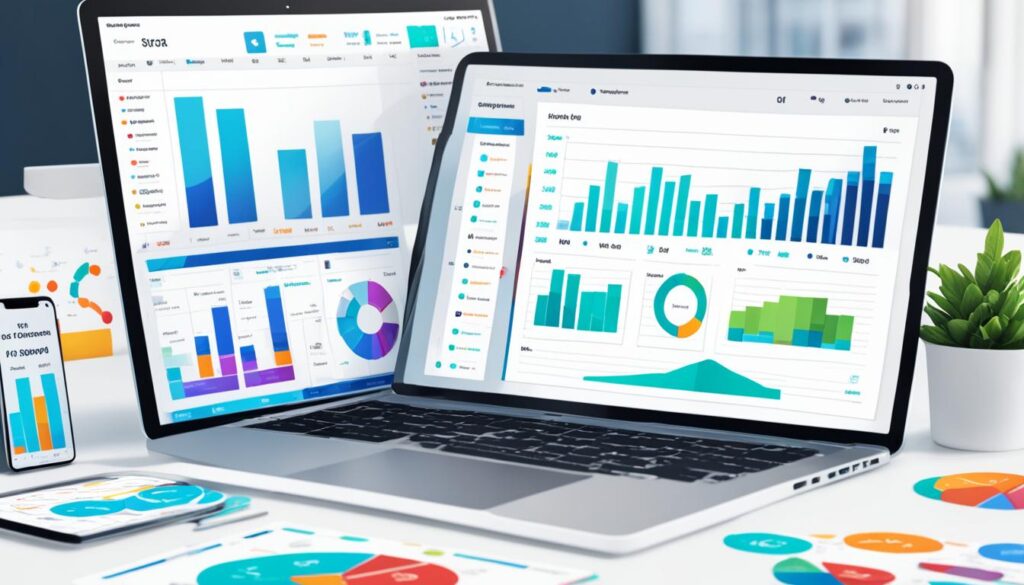Unlock Success with Essential Time Management Facts

“Time is what we want most, but what we use worst.” – William Penn
Time management is not just about being busy; it’s about using your time effectively to achieve your goals and live a fulfilling life. In today’s fast-paced world, the importance of time management cannot be overstated. It is the key to unlocking success in both your personal and professional endeavors.
Key Takeaways:
- Time management is crucial for achieving success in all aspects of life.
- Effective time management allows you to prioritize tasks and set realistic goals.
- Developing a successful time management system involves identifying priorities and utilizing proven techniques and strategies.
- Poor time management can lead to increased stress, inefficiency, and missed opportunities.
- By mastering time management skills, you can enhance productivity, reduce stress, and create more opportunities for success.
The Importance of Time Management
Research shows that effective time management is crucial in today’s fast-paced world. In fact, many individuals struggle to manage their time efficiently, leading to various negative consequences. Let’s take a closer look at why time management is so important and the benefits it can bring to your life and career.
One of the key reasons why time management is important is the alarming data on time wasted. According to time management statistics, the average employee spends about 31 hours per month in unproductive meetings. Additionally, a staggering 89% of respondents admit to wasting time at work every day. These numbers highlight the pressing need for individuals to develop effective time management skills.
When time is mismanaged, it can lead to increased stress levels, reduced efficiency, and poor quality of work. In addition, poor time management can negatively impact your reputation, both professionally and personally. On the other hand, when you have a handle on your time, it brings a host of benefits.
Effective time management allows you to maximize productivity, ensuring that you complete tasks efficiently and meet your goals. It also helps you maintain a positive reputation as someone who is reliable and capable of delivering high-quality work on time. By managing your time effectively, you can lower stress levels and experience a greater sense of control over your life.
Moreover, effective time management opens doors to increased opportunities for success. When you manage your time well, you can seize more opportunities, take on additional responsibilities, and achieve your goals more effectively. Whether you’re a student, professional, or entrepreneur, developing and honing your time management skills is crucial for success in today’s competitive world.

In conclusion, time management is not just a buzzword; it is a critical skill that can have a profound impact on every aspect of your life. By understanding the importance of effective time management, you can take control of your schedule, increase productivity, reduce stress, and create more opportunities for success.
Developing a Time Management System
Creating an effective time management system is essential for maximizing productivity and achieving your goals. By identifying your priorities and setting clear goals, you can better utilize your time and avoid getting overwhelmed by tasks. Here are some techniques, strategies, and tools that can help you develop a successful time management system:
The SMART Approach
An effective method for goal setting is the SMART approach. This acronym stands for Specific, Measurable, Achievable, Relevant, and Time-bound. When setting goals, ensure they are specific, measurable, attainable, relevant to your objectives, and have a defined timeline for completion. This approach helps you stay focused on your goals and provides clarity on what needs to be accomplished.
Time Management Techniques
Implementing time management techniques can significantly improve your productivity. Consider using the following techniques:
- Prioritization: Prioritize your tasks based on their importance and urgency. Focus on high-priority tasks before moving on to others.
- Time Blocking: Allocate specific blocks of time for different tasks or activities. This helps prevent procrastination and ensures that every task receives dedicated attention.
- The 80/20 Rule: Also known as the Pareto Principle, this rule suggests that 80% of your results come from 20% of your efforts. Identify the tasks that contribute the most value and prioritize them accordingly.
Time Management Tools
Using time management tools and apps can further enhance your productivity and organization. Here are some popular options:
| Tool | Description |
|---|---|
| Todoist | A task management app that helps you create to-do lists, set deadlines, and track your progress. |
| Evernote | A versatile note-taking app that allows you to capture ideas, create checklists, and organize your thoughts. |
| Forest | An app that helps you stay focused and avoid distractions by simulating a virtual forest. The longer you stay focused, the more your virtual trees grow. |
By implementing these time management techniques and utilizing the right tools, you can effectively manage your time, increase productivity, and achieve your goals.

Overcoming Time Management Challenges
Effective time management is crucial for achieving productivity and success. However, there are common challenges that many individuals face. By understanding these challenges and implementing effective solutions, you can take control of your time and maximize your productivity.
Common Time Management Challenges
Procrastination: Putting off tasks can lead to wasted time and increased stress. It’s important to combat procrastination and develop strategies to stay focused and motivated.
Interruptions and distractions: Constant interruptions and distractions can significantly impact your productivity. Finding ways to minimize these disruptions is key to staying focused and completing tasks efficiently.
Lack of delegation: Trying to do everything yourself can lead to overwhelm and inefficient use of time. Learning to delegate tasks and utilize outsourcing services can free up your time for more important activities.
Time Management Solutions
Breaking tasks into smaller steps: Instead of tackling a large task all at once, break it down into smaller, more manageable steps. This can help alleviate feelings of overwhelm and make the task more approachable.
Setting deadlines: Establishing deadlines for each task helps create a sense of urgency and accountability. It also helps you prioritize your time and allocate it effectively.
Utilizing productivity techniques: Techniques like the Pomodoro Technique, where you work in short bursts followed by short breaks, can help improve focus and productivity.
Setting boundaries: By setting boundaries with your time and creating dedicated periods of focused work, you can minimize interruptions and distractions.
Delegating tasks: Identify tasks that can be delegated to others and utilize outsourcing services when necessary. This allows you to focus on higher-priority activities and makes better use of your time.
By overcoming these common time management challenges and implementing effective solutions, you can optimize your time and achieve your goals with greater efficiency and ease.
The Role of Technology in Time Management
Technology has revolutionized the way we manage our time, providing us with tools and apps that enhance productivity and organization. By leveraging these time management tools and apps, you can streamline your workflow, track your progress, and stay on top of your tasks.
Calendar Apps
Calendar apps like Google Calendar and Microsoft Outlook are indispensable for scheduling and managing appointments and deadlines. These apps allow you to set reminders, create recurring events, and sync your schedule across multiple devices. With a quick glance at your calendar, you can stay organized and ensure that you never miss an important meeting or task.
Task Management Apps
Task management apps such as Trello and Asana help you stay on top of your tasks and projects. These apps allow you to create task lists, assign due dates, track progress, and collaborate with team members. With features like kanban boards, reminders, and notifications, you can effectively prioritize your tasks and visualize your progress.
Time Tracking Apps
Time tracking apps like RescueTime and Toggl enable you to monitor how you spend your time and identify time-wasting activities. These apps automatically track the time you spend on different applications and websites, providing you with insights into your productivity. By understanding where your time is going, you can make informed decisions on how to allocate your time more efficiently.
| Tool/App | Features | Supported Platforms |
|---|---|---|
| Google Calendar | Scheduling and reminders | Web, iOS, Android |
| Microsoft Outlook | Integrated email and calendar | Web, Windows, iOS, Android |
| Trello | Kanban boards and task management | Web, iOS, Android |
| Asana | Task tracking and collaboration | Web, iOS, Android |
| RescueTime | Time tracking and productivity analysis | Web, Windows, macOS, Android |
| Toggl | Time tracking and reporting | Web, iOS, Android |
These are just a few examples of the many time management tools and apps available. It’s important to explore different options and find the ones that best suit your needs and preferences. By incorporating these technologies into your time management routine, you can boost your productivity, stay organized, and make the most out of your valuable time.

Time Management Skills for Professionals
Effective time management skills are essential for professionals who want to succeed in their careers. By mastering these skills, you can improve your productivity, reduce stress, and achieve your goals more efficiently. Here are some key time management skills that every professional should develop:
1. Organizational Skills
To effectively manage your time, you need to develop strong organizational skills. This includes keeping your workspace organized, creating a system for managing tasks and documents, and prioritizing your work effectively. When everything is well-organized, you can easily find what you need and focus on the most important tasks at hand.
2. Prioritization
Prioritization is a crucial skill for time management. You need to be able to identify which tasks are most important and allocate your time accordingly. By prioritizing your work, you can ensure that you’re focusing on high-value activities and not getting caught up in less important tasks that can be delegated or postponed.
3. Communication
Effective communication is key to managing your time effectively. Being able to clearly communicate your priorities, deadlines, and expectations to others can help streamline workflows, avoid misunderstandings, and ensure that everyone is on the same page. Good communication skills also enable you to delegate tasks when necessary and collaborate efficiently with colleagues.
4. Goal Setting
Setting clear goals is vital for effective time management. By defining what you want to achieve, you can prioritize your tasks and allocate your time accordingly. Make sure your goals are specific, measurable, achievable, relevant, and time-bound (SMART) to ensure that they guide your actions and keep you focused.
5. Stress Management
Stress can hinder your productivity and disrupt your time management efforts. Learning how to effectively manage stress is crucial for professionals. This can include techniques such as taking regular breaks, practicing mindfulness or meditation, exercising, and delegating tasks when overwhelmed. By managing stress, you can maintain focus, stay motivated, and accomplish more in less time.
6. Data-Driven Decision Making
Utilizing data is an important aspect of time management. By analyzing data related to your tasks, projects, and performance, you can gain insights into areas where you can improve efficiency, identify time-wasting activities, and make informed decisions on how to better allocate your time and resources. Embrace data-driven decision making to optimize your time management strategies.
7. Continual Improvement and Reflection
Time management is an ongoing process of learning and growth. Continually assess and reflect on your time management practices to identify areas for improvement. Seek feedback from colleagues or mentors, try new techniques or tools, and experiment with different approaches to discover what works best for you. Remember, mastering time management skills is a journey that requires dedication and a willingness to adapt.
By developing these time management skills, you can enhance your efficiency, productivity, and success as a professional. Remember, effective time management is not about doing more tasks—it’s about doing the right tasks, in the right way, and achieving your goals with ease.

| Technique | Description | Benefits |
|---|---|---|
| Prioritization | Identifying and focusing on the most important tasks |
|
| Time Blocking | Creating dedicated time blocks for specific tasks or activities |
|
| The 80/20 Rule | Focusing on the 20% of tasks that yield 80% of the results |
|
Conclusion
Successful time management is the key to unlocking your true potential and achieving your goals. By understanding the importance of time management and developing your own personalized system, you can take control of your time and maximize your productivity. Remember, effective time management is an ongoing process that requires continuous improvement and learning.
Implementing effective time management techniques is essential. Prioritize your tasks, use time-blocking strategies, and leverage the 80/20 rule to focus on the activities that will yield the most significant results. Additionally, take advantage of technology and tools such as time-tracking apps and task management software to streamline your workflow and stay organized.
Start today and create your own effective time management system. Set clear goals, manage your priorities, and develop strong organizational skills. Continuously evaluate your progress and make adjustments as needed. With a solid time management foundation, you’ll be able to overcome challenges, reduce stress, and achieve your desired outcomes.
FAQ
What is time management and why is it important?
Time management is the practice of organizing and allocating time effectively to prioritize tasks, set goals, and improve productivity. It is crucial for achieving success in personal and professional endeavors, as it helps individuals stay organized, reduce stress, and make the most of their time.
What are the benefits of effective time management?
Effective time management brings numerous benefits, including increased productivity, a positive reputation, lower stress levels, improved work-life balance, and more opportunities for success. It allows individuals to meet deadlines, accomplish goals, and make the most of their time.
How do I develop a time management system?
Developing a time management system involves identifying priorities, setting clear goals, and utilizing techniques and strategies to maximize productivity. Some effective methods include prioritizing tasks, time blocking, utilizing the SMART approach (Specific, Measurable, Achievable, Relevant, Time-bound) for goal setting, and utilizing time management tools and apps.
What are some common time management challenges and how can they be overcome?
Common time management challenges include procrastination, interruptions and distractions, and lack of delegation. To overcome procrastination, breaking tasks into smaller steps, setting deadlines, and using productivity techniques like the Pomodoro Technique can be helpful. Minimizing interruptions and distractions can be achieved by setting boundaries, turning off notifications, and creating a designated workspace. Delegating tasks to others and utilizing outsourcing services can also free up time for more important activities.
How does technology help with time management?
Technology plays a significant role in time management by providing tools and apps that can streamline workflow, track progress, and keep individuals organized. Calendar apps like Google Calendar and Microsoft Outlook help schedule and manage appointments and deadlines. Task management apps such as Trello and Asana help organize and prioritize tasks. Time tracking apps like RescueTime and Toggl enable individuals to monitor their time usage and identify time-wasting activities.
What time management skills are important for professionals?
Time management skills for professionals include strong organizational skills, the ability to prioritize tasks effectively, effective communication, goal setting, stress management, using data to make informed decisions, and delegating tasks when necessary. Continual improvement and reflection are also important to master time management.
What is the key to developing an effective time management system?
The key to developing an effective time management system is understanding the importance of time management, identifying priorities and goals, and continuously improving time management skills. By implementing effective time management techniques and utilizing technology and tools, individuals can unlock their true productivity potential and achieve their goals.






